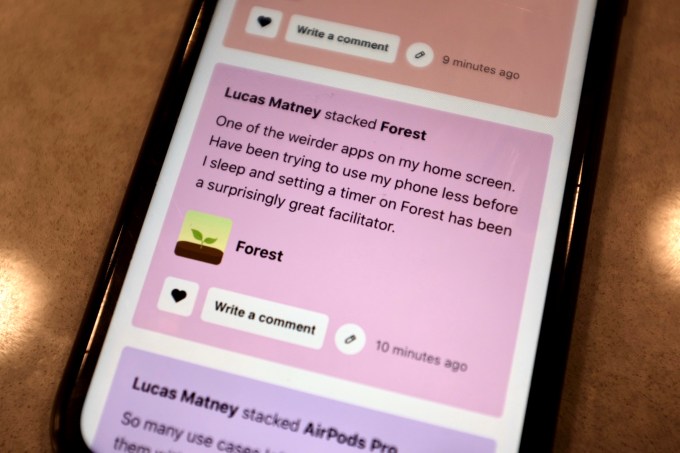The team behind Product Hunt is launching a new social network called YourStack, a platform aiming to connect people that are passionate about products and help them discover what things their friends love.
“It’s super simple, you just search through and create a stack of products you love,” Product Hunt founder Ryan Hoover tells TechCrunch. “We wanted to make sure it wasn’t just software, but also games and books and beauty products, you name it.”
YourStack’s catalog doesn’t have every product under the sun, but if it’s a tech object, startup service, app or direct-to-consumer thing, chances are you can “stack” it. Once you add it to your profile, you can write a quick little descriptor and also share some tips and tricks you’ve learned about the product in question.

Product Hunt was acquired by AngelList just over three years ago, and since then Hoover and company have grown the platform into a go-to hub for makers looking to launch tech products. The team of 20 is now splitting their time between Product Hunt and YourStack, hoping that the new venture can lead to a platform that’s more centered on people and the products they use. While a social network based entirely around the multi-national brands that people love is something I’d love to hear Bernie Sanders’ thoughts on, it’s clear there’s an open opportunity here.
Social media platforms like Instagram have given influencers a huge platform for paid product endorsements, but because there’s so much schilling, consumers can’t put a ton of trust in the recommendations. Platforms like Twitter have been great for this inside the tech industry, but there’s no UI for it, so you sort of have to be at the right place at the right time, and, furthermore, the tech folks who have these great product insights are too busy being thought leaders.
If YourStack takes off, who knows what it could eventually become, but the goal seems to be to let users gain access to more personal product recommendations. On the product creator side, Hoover believes YourStack could give some great qualitative data that allows makers to understand how customers are using what they’ve built.
The product is in beta right now with a waitlist that’s already a few thousand users deep, but Hoover says the goal right now is to gather feedback.
“With a lot of social products, you don’t know how people are going to use them when they first start,” Hoover tells TechCrunch. “We actually had a very similar approach when we launched Product Hunt, where we let more and more people onto it each day and that was really effective in letting it slowly grow rather than leading people to a bad experience.”
Source: Tech Crunch Startups | Product Hunt launches beta of YourStack, a home for your favorite things